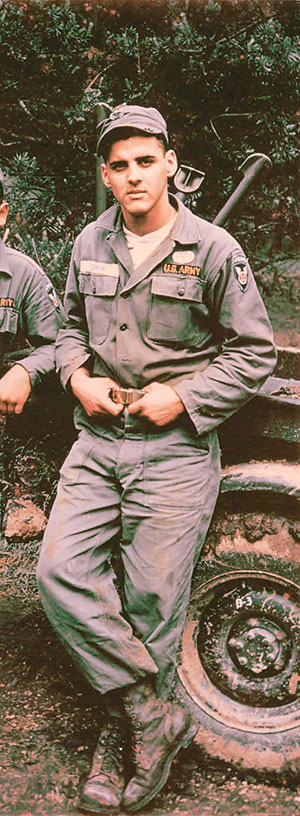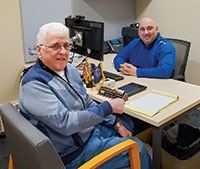
Army Airborne veteran receives VA benefits,
As a young paratrooper in the 1950s, Matt Cimini was no stranger to relatively safe, controlled falls from great heights, but it was an unexpected drop in West Germany that would lead to a lifetime of pain.
Even before his enlistment, Cimini had been drawn to a specific military occupation by a civilian boss who’d served with the famed 82nd Airborne Division.
“He directly ordered me to go airborne,” said Cimini. “I said OK.”
Cimini completed 17 jumps between jump school and his time with the 11th Airborne Division. Together with the men in his unit, he made the trek from Fort Campbell, Kentucky, to train in Europe.
“The jumping was OK,” he said, “but the worst injury I got was sustained from leading a patrol at night.”
The soldiers guided off the road during the training mission in the woods around Munich, flanked left and were about to simulate open fire on their target when Cimini unexpectedly disappeared.
“I went down this hole, and I swore I broke the ankle—I swore it,” Cimini said. He was right, as doctors would—much later in life—confirm the bone fracture.
After the fall, he remained in a small medical pup tent for three days and was placed on limited duty. After being honorably discharged in 1957, Cimini returned to civilian life and his old job driving a truck for a meatpacking company in Providence, Rhode Island.
A year later, he attempted to get his ankle treated through the Department of Veterans Affairs but was turned away.
“More or less, they said, ‘Forget about it,’” Cimini said. “If I knew what DAV was at the time, it probably would have gone a hell of a lot different.”
The injured ankle only worsened over time, and his years running, jumping and navigating field problems in the Army caught up with him as the pain radiated up both of his legs through his knees, hips and lower back.

DAV National Service Officer Kenny Andrade, who met Cimini in 2013, instantly recognized the toll service had wrought on him.
“You can tell what this guy’s been through,” said Andrade. “His gait, the way he favors one side over the other. His body looked like it’s crooked; he leans to one side all the time.”
Cimini also told Andrade about the stiffness around both of his ankles and the throbbing pain every time he walked.
The years of gnawing aches motivated Cimini—after some persuasion—to submit a claim to the Department of Veterans Affairs with DAV’s assistance. Andrade filed the claim in early January 2020 but was quickly denied due to the dearth of medical evidence in Cimini’s military records.
Armed with the knowledge imparted by Andrade and Mike Zibrida, who supervises the DAV office in Providence, Cimini was examined by a private doctor, who unveiled just how serious that pivotal fall was more than six decades ago.
With a new medical opinion, supported by recent evidence and documentation, Andrade refiled the claim last year. In July 2020, Cimini’s claim was approved by the VA, significantly increasing his benefits and disability compensation.
“It’s been a long road, but we finally have gotten to where he gets the medical treatment and recognition he deserves for his lower extremities,” said Andrade.
“I’ve lived with a lot of pain—a lot of pain,” Cimini said. But now that he is able to get the care he needs, he was fitted with a brace for his injured ankle, which he said helps with that pain immensely.
The 84-year-old Army veteran lauds the work Andrade and Zibrida did on his behalf.
“DAV, for any veteran, particularly if you have a problem, is the absolute answer,” he said. “The VA is good, but they’re limited—they’re not going to go to hearings for you. They’re not putting in claims like the DAV would.”






